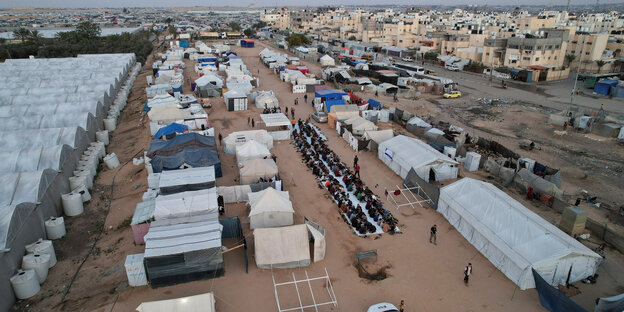An Israeli army ground offensive on the border town of Rafah appears to be approaching. Negotiations with Hamas are at a standstill.

A drone shot shows Palestinians fleeing Gaza in Rafah on April 6. Photo: Shadi Tabatibi/Reuters
SEDAN taz/ap | The signals coming these days from Israel and the radical Islamic Hamas are ambiguous. Hamas said in a statement that the current ceasefire proposal does not meet any of its demands. At the same time, the organization stated that it will continue to examine the proposal and provide its response to the mediators.
Another indirect round of negotiations on a ceasefire and the release of hostages between Hamas and Israel ended on Monday in Cairo. The sticking point in the negotiations appears to be the duration of the ceasefire. While Hamas calls for a complete ceasefire, Israel has so far only been willing to accept a temporary ceasefire. There is also so far no agreement between the warring parties on the question of whether internal Palestinian refugees who have fled to the south should be given the opportunity to return to their homes in the north.
The Israeli army withdrew much of its ground troops from the Gaza Strip on Sunday. Only one brigade remains on the coastal strip and continues to divide the Gaza Strip into a southern zone and a northern zone in a corridor. It is still unclear whether the withdrawal should be understood as preparation for a possible ceasefire or, on the contrary, as preparation for an offensive on the city of Rafah, located at the southern end of Gaza.
Israeli Prime Minister Benjamin Netanyahu announced in a video message on Monday night that the date had been set for an offensive on Rafah. The Israeli military also said it was purchasing 40,000 tents to prepare for the evacuation of hundreds of thousands of Palestinians from the border town to Egypt. The Israeli military suspects that four Hamas battalions are stationed in Rafah and that Hamas leaders are also hiding there. It is possible that some of the Israeli hostages are also being held there.
Violent international resistance against Israel
Regarding the Rafah offensive, Netanyahu is under pressure from two sides. Shortly after the withdrawal of Israeli troops, his right-wing Internal Security Minister, Itamar Ben-Gvir, threatened that Netanyahu would no longer have a governing coalition if there was no offensive in Rafah. However, Israel has frequently announced an attack on Rafah in recent weeks but has not yet carried it out.
This is probably also due to strong international resistance to the plans, also from the US. In Washington there are great doubts that the Israeli evacuation plan is viable. Around one and a half million Gazans have fled to the small southern city and have been living there in catastrophic conditions, crammed into close quarters for months.
French President Emmanuel Macron, Egyptian President Abdel Fattah al-Sisi and Jordanian King Abdullah II denounced in a joint article in the Washington Post On Tuesday he called for an immediate ceasefire and warned of the “dangerous consequences of an Israeli offensive in Rafah.”
Meanwhile, Turkey is restricting the export of dozens of products to Israel, including construction materials and chemical fertilizers, due to Israel's military operation in the Gaza Strip. In response, Israel is also preparing an import ban for Turkey, according to Israeli Foreign Minister Israel Katz.